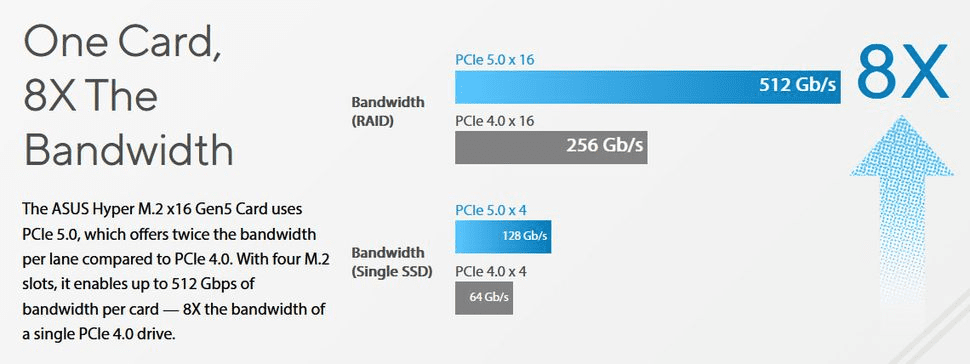ASUS PCIe Card and PCIe 5.0 SSDs
A new storage adapter with improved performance has been secretly released by Asus. Twitter/X storage investigator momomo_us discovered that product pages for the Asus Hyper M.2 x16 Gen5 Card have been added to the website. This is a substantial improvement to the Hyper M.2 x16 Gen 4 card, providing up to double the possible bandwidth and, consequently, support for up to 512 Gbps if your platform is capable of achieving that speed.
According to the product description, the Asus Hyper M.2 x16 Gen5 Card can accommodate a maximum of four NVMe M.2 SSDs in a single installation. Users are free to combine different types of storage devices. Users will be able to combine PCIe 5.0/4.0 M.2 drives, according to the official specifications provided by Asus. M.2 2242, 2260, 2280, and 22110 devices may all be put in any of the four slots, and the Q-Latch mechanism makes installation and removal of these devices simple.

It is possible that there will be some concerns with power and cooling with the newest and fastest drives. On the other hand, Asus has added an additional 6-pin PCIe power connector to this card and claims that the onboard two-phase power solution is capable of delivering up to 14W to each drive, which is more than adequate.
You can see a cooling fan and four M.2 slots even though the card’s shroud is covering them up. This operates similarly to a blower-style graphics card fan, drawing in cold air from the fan end of the card and forcing it to be pushed across the M.2 card slots before exhausting it through the heavily perforated mounting bracket.
When paired with top and bottom M.2 thermal pads, Asus claims that this is sufficient to “reduce temperature-induced throttling during heavy, sustained data transfers.” The Asus Fan Xpert 4 software offers a comprehensive set of control options that may be utilized for the fan. You may also control the fan’s operation using the button that is located in the back I/O section of the card.
In terms of speed, the 512 Gbps bandwidth is achieved by aggregating the output of four fast PCIe 5.0 M.2 NVMe SSDs operating in RAID 0 mode. This results in a striped configuration. Up to 128 gigabits per slot, as seen in the chart on the right, is one of the amazing performance boosts that can be achieved by using this new PCIe storage card.

Before you go out and buy one of these Asus Hyper M.2 x16 Gen5 (or Gen4) Cards, there are a few things you need to take into consideration first. The capabilities of M.2 SSDs housed on add-in cards were outlined in a FAQ that was issued by Asus. The motherboards in question are currently supported by AMD and Intel. In the frequently asked questions section, it is highlighted that the “maximum M.2 SSDs support will vary depending on different CPUs.” PCIe bifurcation has to be supported by your motherboard.
The FAQ compatibility table also shows, for instance, that computers with processors from the Intel Core family and the most recent iterations of motherboards and graphics cards are only able to use two of the four M.2 storage slots at the same time (because there is a maximum of 16 CPU PCIe 5.0 lanes available), but they can still take advantage of the hosted drives’ full potential.
On the other hand, users of AMD Ryzen who have the most recent platforms are able to make use of all four slots (a maximum of 28 CPU PCIe 5.0 lanes). Additionally, Asus suggests that all customers update to the most recent version of their motherboard’s BIOS.
The price of the Asus Hyper M.2 x16 Gen5 Card has been verified by the company as being $79.99, and its availability through channel distribution is expected to take between seven and fourteen days.


[…] the OCP Global Summit in 2023, ASUS will present cutting-edge cloud […]
[…] Mobile Legends: Bang Bang (MLBB)-themed ROG Phone 6 and 6D gaming phones were released by the ASUS Republic of Gamers (ROG) in order to commemorate the commencement of a brand-new two-year […]
[…] constructed with the AMD “Zen 4” architecture and provide desktop users with up to 48 PCIe 5.0 […]
[…] for Slow HDD Mode. Since the Ally has a lightning-fast PCIe SSD, we can turn off this feature even though it enhances speed on older spinning hard […]
[…] and interface to the system, the package also contains double-sided tape, a 60cm iCUE LINK cable, a PCIe power adapter, a USB cable, and fan screws. The extension Kit, in contrast, simply comprises the fan […]
[…] compilation, generative design, and rendering. It is the first platform with up to 144 useable PCIe Gen5 lanes, making it suitable for systems with many add-in cards, connectivity options, and huge storage […]
[…] the past year, SSD costs have decreased significantly, with many 1TB SSDs currently being less expensive than 1TB HDDs. But a Digitimes story claims that controller […]
[…] alternative applications for the GPUs that it was developing. In addition, the limits in terms of PCIe lanes and driver compatibility make things more complicated, since the GPU cannot be optimized in […]